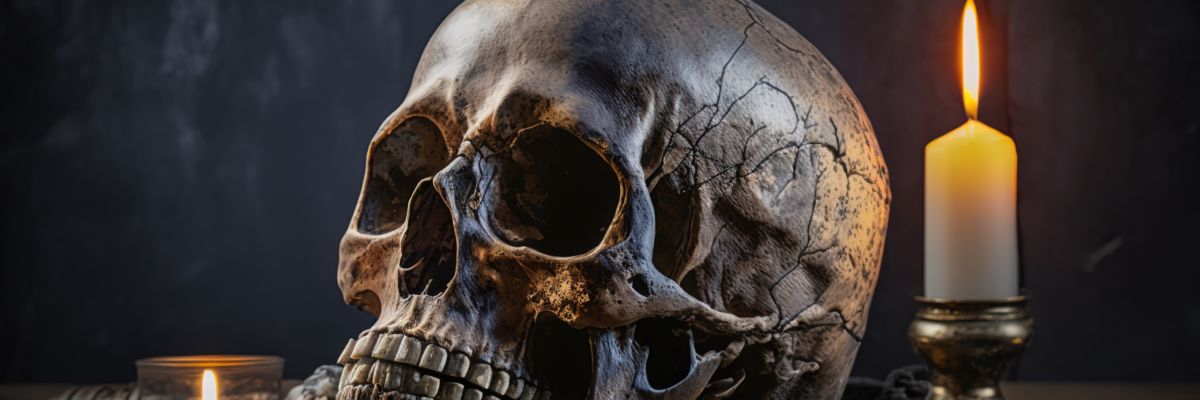
Episode 62: Year B – 4th Sunday of Ordinary Time
In this episode of the Sunday Catholic Word, we focus on three details that are relevant for doing apologetics. The first comes from the first reading, taken from Deuteronomy 18:15-20. The apologetical topic that comes to the fore is the intercession of the saints, and particularly the objection from necromancy. The second and third details come from the Gospel reading, which is taken from Mark 1:21-28, and it relates to Jesus’ divinity.
Readings: Click Here
Looking for Sunday Catholic Word Merchandise? Look no further! Click Here
Hey everyone,
Welcome to The Sunday Catholic Word, a podcast where we reflect on the upcoming Sunday Mass readings and pick out the details that are relevant for explaining and defending our Catholic faith.
I’m Karlo Broussard, staff apologist and speaker for Catholic Answers, and the host for this podcast.
In this episode, we’re going to focus on three details that are relevant for doing apologetics. The first comes from the first reading, taken from Deuteronomy 18:15-20. The apologetical topic that comes to the fore is the intercession of the saints, and particularly the objection from necromancy. The second and third details come from the Gospel reading, which is taken from Mark 1:21-28, and it relates to Jesus’ divinity.
Let’s get started with the first reading. Again, it’s taken from Deuteronomy 18:15-20 where Moses prophesies about a coming prophet like unto himself. Here’s what Moses says:
A prophet like me will the LORD, your God, raise up for you
from among your own kin;
to him you shall listen.
This is exactly what you requested of the LORD, your God, at Horeb
on the day of the assembly, when you said,
‘Let us not again hear the voice of the LORD, our God,
nor see this great fire any more, lest we die.’
And the LORD said to me, ‘This was well said.
I will raise up for them a prophet like you from among their kin,
and will put my words into his mouth;
he shall tell them all that I command him.
Whoever will not listen to my words which he speaks in my name,
I myself will make him answer for it.
But if a prophet presumes to speak in my name
an oracle that I have not commanded him to speak,
or speaks in the name of other gods, he shall die.'”
Now, to see how this relates to apologetical discussions we have to back up a few verses, particularly verses 10-12:
10 There shall not be found among you any one who burns his son or his daughter as an offering, anyone who practices divination, a soothsayer, or an augur, or a sorcerer, 11 or a charmer, or a medium, or a wizard, or a necromancer. 12 For whoever does these things is an abomination to the LORD; and because of these abominable practices the LORD your God is driving them out before you.
Some Protestants appeal to these verses when objecting to the practice of invoking the intercession of the saints, particularly the prohibition of necromancy. If the Bible prohibits communicating with the dead, so it’s argued, then the practice of invoking the saints is prohibited, since such a practice involves communication with the dead.
Now, one way to answer this objection is to say Deuteronomy 18:10–12 is not condemning communication with the dead, but the practice of conjuring the spirits of the dead with a desire to gain hidden/supernatural knowledge apart from God.
This is supported by the very definition of the word “necromancy.” The Merriam-Webster dictionary online defines necromancy as “conjuration of the spirits of the dead for purposes of magically revealing the future or influencing the course of events.” The term comes from two Greek words: nekros (“dead person”) and manteia (“oracle,” “divination”).
Now, here is where our first reading comes into play: it provides further evidence why eliciting supernatural knowledge or oracles from the dead is what Deuteronomy 18:10–12 has in mind. Moses gives instructions concerning a coming prophet as a follow up to the prohibition of necromancy, along with “divination,” seeking a “medium,” a “sorcerer,” and a “wizard,” all of which have to do with an attempt to gain knowledge—knowledge beyond ordinary human intelligence.
Recall, in verse 15, Moses says, “The Lord your God will raise up for you a prophet like me from among you, from your brethren—him you shall heed.” In other words, there is no need to go to mediums, sorcerers, wizards, and necromancers to gain knowledge because God will send a prophet of his own. God then speaks through Moses and says in verse 18, “I will put my words in his mouth, and he shall speak to them all that I command him.” As for the prophet who presumes to speak in God’s name without God’s command or the prophet who speaks in “the name of other gods,” God says in verse 20 that prophet “shall die.”
Since the context is about looking to God’s prophet for divine oracles and not to mediums, sorcerers, wizards, and necromancers, it’s clear that the prohibition has to do with conjuring up the dead to seek supernatural knowledge apart from God (necromancy), not speaking or communicating with the dead.
Now, the Catholic practice of invoking the saints to pray for us simply isn’t necromancy. Asking saints to pray for us is an entirely different thing from necromancy. The Church doesn’t teach that we are to invoke the saints by conjuring their spirits to gain secret knowledge or knowledge of the future apart from God—in fact, this is condemned in paragraph 2116 of the Catechism. Since the Catholic practice of petitioning the saints to pray for us is not a form of necromancy, it doesn’t fall under the prohibition in Deuteronomy 18:10–12.
We can now turn to the detail from the Gospel reading, which, again, is taken from Mark 1:21-28. Here’s the whole passage:
Then they came to Capernaum,
and on the sabbath Jesus entered the synagogue and taught.
The people were astonished at his teaching,
for he taught them as one having authority and not as the scribes.
In their synagogue was a man with an unclean spirit;
he cried out, “What have you to do with us, Jesus of Nazareth?
Have you come to destroy us?
I know who you are—the Holy One of God!”
Jesus rebuked him and said,
“Quiet! Come out of him!”
The unclean spirit convulsed him and with a loud cry came out of him.
All were amazed and asked one another,
“What is this?
A new teaching with authority.
He commands even the unclean spirits and they obey him.”
His fame spread everywhere throughout the whole region of Galilee.
As I mentioned in the beginning of this episode, there are two details that relate to Jesus’ divinity. The first is the people’s astonishment of Jesus’ unique teaching authority: “The people were astonished at his teaching, for he taught them as one having authority and not as the scribes.”
This detail comes into play when arguing that Jesus is not a lunatic within the trilemma argument. Recall, the trilemma argument considers the two alternative explanations to Jesus’ claims to divinity: either he’s lying or he’s a lunatic. The people’s astonishment at Jesus’ unique teaching authority gives reason to think Jesus is not a lunatic. Think about it: how could someone who doesn’t really know who he is teach with such certainty and authority about divine mysteries? And to teach in such a way that people who are educated in their religion be so astonished? It seems that these people would be able to sniff out Jesus’ lunacy if he were a lunatic.
The second detail that relates to Jesus’ divinity is his rebuke of the demon. Notice Jesus doesn’t drive the demon out in the name of Yahweh, nor does he invoke power from God to do so. He simply gives the command and the demon obeys. This reveals that Jesus views himself to have the power to drive demons out in his own person. In other words, he views himself to be the source of such power, which can only mean he thinks he’s God, since only God has authority over the demonic in virtue of who he is.
Now, that the demons obey the command reveals Jesus doesn’t just think he’s divine but proves his self-understanding of being God to be true. This gives us reason, therefore, to assent to the idea that Jesus is God.
Well, my friends, that does it for this episode of the Sunday Catholic Word. The first reading and the Gospel reading for this upcoming 4th Sunday of Ordinary Time, Year B, doesn’t sell us short when it comes to apologetical details. The first reading gives us opportunity to reflect on the practice of invoking the saints’ intercession and the Gospel reading gives us opportunity to reflect on Jesus’ divinity.
As always, I want to thank you for subscribing to the podcast. And please be sure to tell your friends about it and invite them to subscribe as well at sundaycatholicword.com. You might also want to check out the other great podcasts in our Catholic Answers podcast network: Cy Kellet’s Catholic Answers Focus, Trent Horn’s The Counsel of Trent, Joe Heschmeyer’s Shameless Popery, and Jimmy Akin’s A Daily Defense, all of which can be found at catholic.com.
One last thing: if you’re interested in getting some cool mugs and stickers with my logo, “Mr. Sunday podcast,” go to shop.catholic.com.
I hope you have a blessed 4th Sunday of Ordinary Time. Peace!



